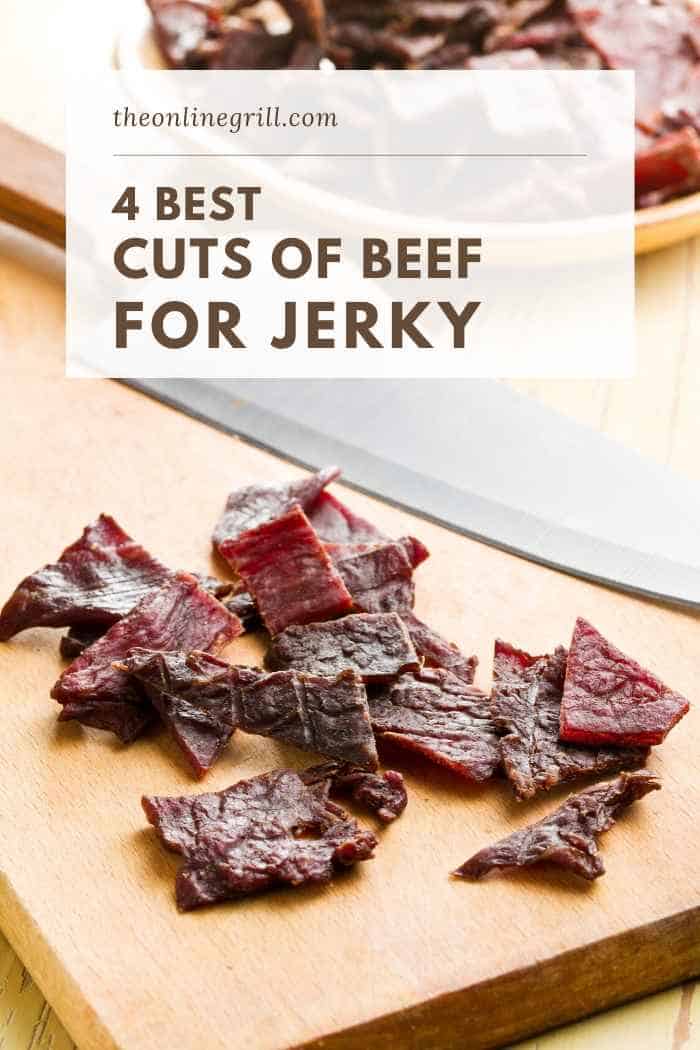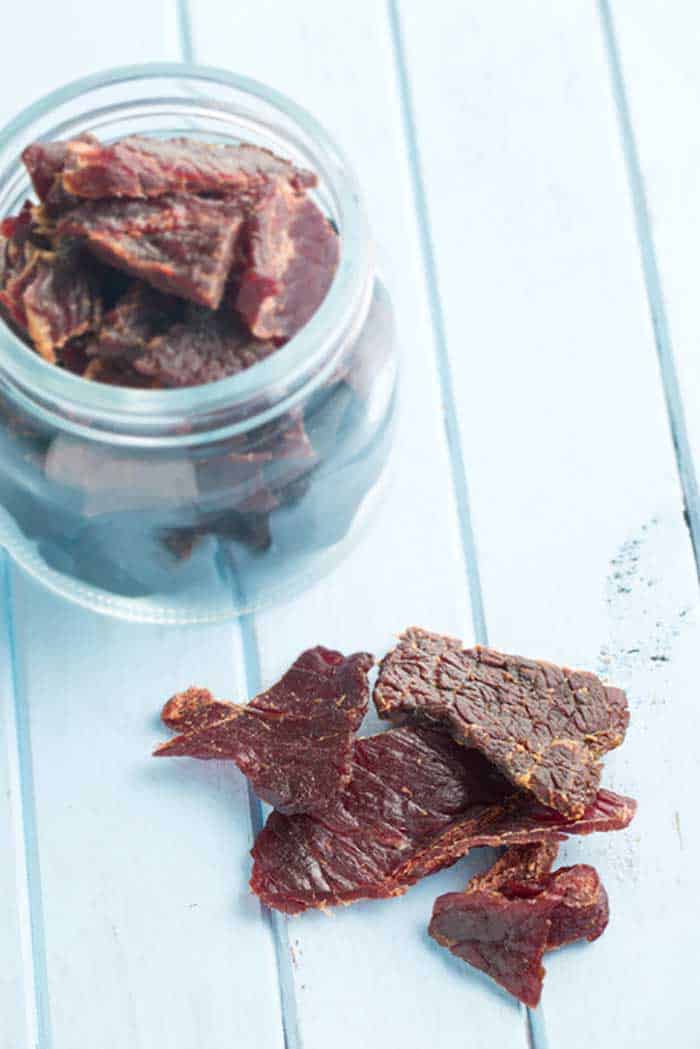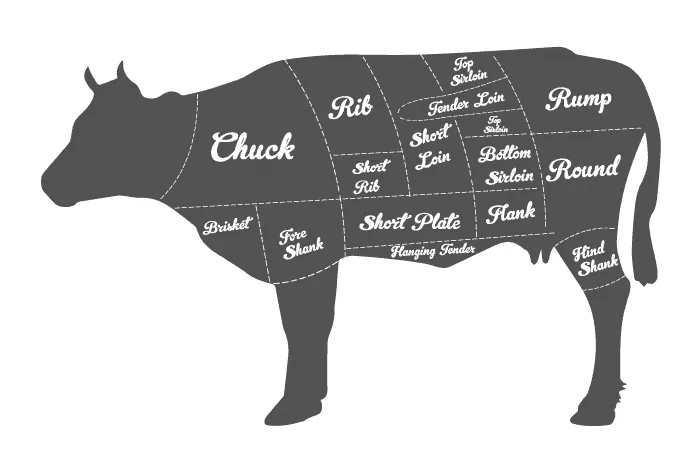Best Meat for Tender Beef Jerky

Beef jerky is best when made from scratch. But the texture and flavor of your meat will come down to your choice of beef. Learn which beef cuts are best for jerky, and everything you need to know to get started with smoking your own snack strips.

- Shank
- Round
- Sirloin
- Flank steak
- How to make beef jerky
- How to marinade beef pieces for jerky
- How to make beef jerky in the oven
- How to store beef jerky
Great homemade jerky is one of the purest homemade snacks out there. Tough, chewy and delicious, once you get on the jerky train then it's hard to get off it. It's what BBQ smoking was made for.
Despite this, not a lot of people make their own at home. It might seem like a daunting process, but it's actually a lot easier than you might think.

The biggest determining factor of the success of your homemade jerky will be the cut of beef that you choose.
There are four cuts of beef that are perfect for jerky: Shank, Round, Sirloin, and Flank.
But what makes these cuts the right fit? Here's my breakdown of the four best beef cuts for jerky, and how each one might be the right choice for you.

Shank
Shank can be found at the upper portion of the legs of the cow, both front and rear, and can be found under the brisket at the front of the round at the back.
Because it tends to be tough and low in fat, beef shank is great for jerky. Its high collagen content also makes it good for stews and soups.
It can be bought fairly cheaply too, which makes it a great starter meat if this is your first time making beef jerky. It's usually sold with the bone and marrow still in it, but for jerky try to buy it with the bone removed to help save you time when you prepare your meat.
Round
Now for one of the most commonly used cuts for smoked beef jerky. Beef round is found at the rear of the cow, and is usually split between two categories: Top round and bottom round.
There is one major reason why round is so great for jerky: Muscles.
Cows rear legs are one of its strongest parts, so it should come as no surprise that it is packed full of muscle. It's lean and rich in protein. As a result, the fat content here is really low and is perfect for jerky.
When you buy it you might find some sinew and fat on the outer side of the cut, but don't be put off. You can easily trim and remove these, and get cooking right away.
For an even chewier and more tender jerky, you can only easily remove some of the grain found on the round. This is easily visible.
Sirloin
Sirloin just had to make it to this list. It's tender, lean, and ideal for jerky.
Sirloin sits towards the cow's hind legs, located near to where the bulk of the animal's muscles are. Just like with round, this means that it's largely comprised of muscle, and is therefore low in fat and high in protein.
One thing to keep in mind is that sirloin is a little pricier than either round or shank, but for good reason: It's ridiculously delicious.
Flank steak
Flank is found in the lower chest of the cow or abdominal region, and is another cut that's lean and low in fat.
Its grain is easy to see, which makes it easy to cut into slices. This is also helped by the shape of the muscle itself, making it easy to hold and work with when carving.
Flank is one of the most trusted cuts of beef for making jerky. However, just like sirloin, it's also a little dearer than round or shank, so the price can be a little eye-watering to newcomers.
Decided on which beef cut you're going for? Let's get into making some beautiful jerky!

How to make beef jerky
We're going to start by freezing our beef. I know this might seem strange, but trust me.
Allow it to freeze for between 45 and 60 minutes, but not until it's frozen solid. We want the meat to firm up enough for it to be easy enough for you to start cutting into slices.
Remove from the freezer and place it between two layers of plastic wrap or parchment paper.
Tenderize it using a tenderizing mallet ( like this ), flattening the meat and softening its muscle fibers.
Look for the grain in your meat. We're going to use this as a guide and cut the beef in the opposite direction to it.
Slice the beef against the grain. Try to aim for slices around one-quarter and one-third of an inch in thickness. You can vary from this if you prefer, but try to make the slices fairly uniform.
If you struggle with cutting evenly, consider getting yourself a home meat slicer.
How to marinade beef pieces for jerky
This is where we get to really infuse our jerky with added flavor.
I like to use a mix of Worcestershire sauce, soy sauce and paprika like in this recipe.
Allow the beef to slices to sit in the marinade for an hour, in the refrigerator.
How to make beef jerky in the oven
For the best results, use a wire rack and place it on top of a baking sheet. Take the properly cut beef strips and place them on the rack. The strips will dry faster as the juices run onto the sheet lying underneath.
Start baking for 3 to 4 hours with the oven turned to around 175°F. However, this time may vary according to the type and effectiveness of the oven used, as well as the thickness of your beef.
Don't just set and forget though. Every now and then, be sure to check on the progress of your jerky.
Fortunately, it's easy to know how to tell when jerky's done . As you approach the three-hour mark, you can take a strip of your jerky from the oven and taste it. When you taste it, pay attention to the meat's texture. If it feels too soft or quite fleshy, put it back in the oven. If you feel it's chewy and tough you can remove the remaining jerky from the oven.
It should be noted that the drier the jerky, the easier it will be to store and preserve it. However it's a fine line so don't overdo it otherwise you'll run the risk of it turning into brittle crackers.
How to store beef jerky
Look for a good airtight container and store your jerky there. It can be stored in an airtight container for about a week.
If you think your jerky is slightly on the fatty or undercooked side, you can store it in the refrigerator.
Source: https://theonlinegrill.com/best-cuts-of-beef-for-jerky/